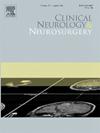脑卒中康复期间2型糖尿病和认知功能与恢复口服摄入的关系
IF 1.8
4区 医学
Q3 CLINICAL NEUROLOGY
引用次数: 0
摘要
物理因素包括运动和平衡功能与接受鼻胃管喂养的脑卒中患者恢复口服进食有关。然而,非物理因素的关联尚不清楚。本研究的目的是探讨与中风后恢复口服摄入相关的非物理因素,并阐明它们如何影响恢复的时间过程。方法对116例脑卒中后接受鼻胃管喂养的患者进行回顾性分析。研究了中风康复机构出院时恢复口服摄入的物理和非物理因素的关系。我们还利用生存分析评估了非物理预后因素的具体组合如何影响恢复的时间过程。结果116例患者中,59例(50.4 %)恢复口服。糖尿病史(P <; 0.001)和较高的认知功能独立性评分(C-FIM) (P = 0.03)与出院时恢复口服摄入显著相关。这些非物理因素对预测恢复口服摄入的传统危险因素具有附加价值。与C-FIM评分较低的非糖尿病患者相比,有糖尿病病史的患者与恢复口服摄入显著相关(<;18)生存分析(P = 0.001),这种差异在卒中后90天变得明显。结论脑卒中后接受鼻胃管喂养的患者,有糖尿病病史和较好的认知功能与恢复进食有显著的非物理因素关系。本文章由计算机程序翻译,如有差异,请以英文原文为准。
Association of type 2 diabetes mellitus and cognitive function with the resumption of oral intake during stroke rehabilitation
Background
Physical factors including motor and balance functions are associated with resumption of oral intake of the stroke patients receiving nasogastric tube feeding. However, association of non-physical factors remains unclear. The aims of this study are to explore non-physical factors associated with resumption of oral intake after stroke and to clarify how they affect the time course of the resumption.
Methods
A total of 116 patients receiving nasogastric tube feeding after stroke were retrospectively analyzed from a single center observational cohort database. Associations of physical and non-physical factors with resumption of oral intake at discharge from the stroke rehabilitation facility were investigated. We also evaluated how the specific combination of non-physical prognostic factors affected the time course of resumption using survival analyses.
Results
Among 116 patients, 59 (50.4 %) resumed oral intake. History of diabetes mellitus (DM) (P < 0.001) and higher cognitive functional independence scores (C-FIM) (P = 0.03) were significantly associated with the resumption of oral intake at discharge. These non-physical factors had an additive value on conventional risk factors to predict resumption of oral intake. Patients with a history of DM were significantly associated with improved resumption of oral intake than with non-DM patients with lower C-FIM scores (< 18) by survival analysis (P = 0.001), and this difference became prominent after 90 days post-stroke.
Conclusion
A history of DM and better cognitive function as non-physical factors were significantly associated with the resumption of oral intake in patients receiving nasogastric tube feeding after stroke.
求助全文
通过发布文献求助,成功后即可免费获取论文全文。
去求助
来源期刊

Clinical Neurology and Neurosurgery
医学-临床神经学
CiteScore
3.70
自引率
5.30%
发文量
358
审稿时长
46 days
期刊介绍:
Clinical Neurology and Neurosurgery is devoted to publishing papers and reports on the clinical aspects of neurology and neurosurgery. It is an international forum for papers of high scientific standard that are of interest to Neurologists and Neurosurgeons world-wide.
 求助内容:
求助内容: 应助结果提醒方式:
应助结果提醒方式:


